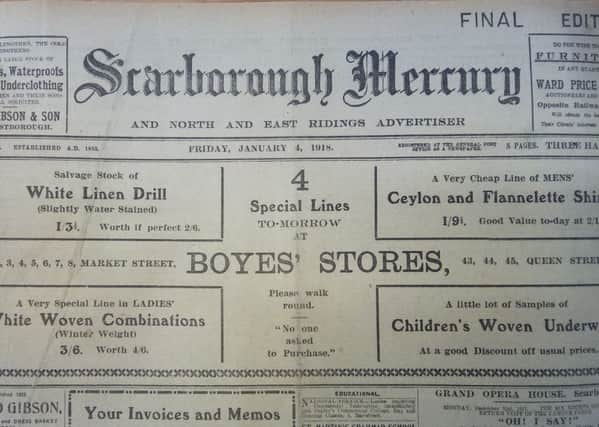1918 Court: A clear case of food hoarding at Scalby


The magistrates on the bench were Mr F Baker (in the chair), Dr Candler Hope, and Messrs AH Robinson, C Leadley and RS Blaylock.
Mr Russell Richardson appeared for the prosecution, and Mr J Whitfield represented the defendant, who did not appear.
Advertisement
Hide AdAdvertisement
Hide AdThe summons dealt with the alleged hoarding of sugar to the extent of 60½lbs.
Mr Richardson said he appeared on behalf of Mr AW Jaques, the executive officer and inspector appointed by the Scalby Urban District Food Control Committee, and who was duly authorised to take summary proceedings under what was commonly known as the Food Hoarding Order. He believed that was the first prosecution under the order in that court, and he thought he could satisfy them that it was a clear case of hoarding coming well within the meaning of the order.
The defendant was a lady of independent means residing at the Laurels, Scalby. Mr Jaques, from information received, having come to suspect that this lady was infringing the order, wrote to the District Controller, who said it was a proper case to be investigated, and he instructed his chief inspector Mr Arundell, to investigate the matter and armed him with the necessary warrant.
Mr Jaques, Mr Arundell and Sergt Daykin visited defendant’s house. Mr Arundell explained the object of the visit and told her he had reason to believe that she had greater quantities of food than was allowed. She denied absolutely that that was fact. Mr Arundell told her they would have to search the premises and produced a search warrant. Defendant refused to allow the officers to search the premises and throughout the whole proceedings at the house she obstructed them in every way possible both by declining to give up keys of cupboards, or rooms, or boxes which were locked. Although, in the space of about three hours they got sufficient evidence without breaking open cupboards, boxes or damaging furniture which they had the power to do. Mr Richardson then gave particulars, afterwards sworn to by Mr Jaques, of the finding of sugar in various places. The household, he added, consisted of defendant and her maid. Altogether there were found in the house in different places 60½lbs of sugar, the largest packet containing 4lbs. This was sufficient at the preset rate of rationing of this particular article of food to last this particular household a year and two months.
Advertisement
Hide AdAdvertisement
Hide AdHe contended that it was not intended for ordinary consumption, and he reminded the magistrates that in any proceedings for breaches, the burden of proving that it was rested with the defendant. In spite of the fact that there was a considerable quantity of sugar in the house, defendant, ever since the rationing order came into force, had obtained the regulation allowance for herself and her maid from her local retailer. Mr Richardson said if the magistrates were satisfied with the evidence, he was instructed of a severe penalty, on account of defendant’s obstruction of the officers and the fact that she told deliberate lies, with the intention of putting the officer off the search. He asked for costs, including advocate’s fee and the confiscation of so much of the food.
Defendant told witness several times before the rationing order came out that she had sugar in the house which she was going to use to make preserve, but she never had anyone in her employ who could make it when the fruit was to be had.
The magistrates’ clerk said that no one was entitled to have more than the regulation quantity that was one reason why people were given the opportunity of delivering surplus to hospitals and the like.
Mr Whitfield, in addressing the court, for the defence, said defendant had been in the habit of keeping the sugar in the room in which it was found. It was not put there in order to conceal it. A large quantity of the sugar, now the subject of the charge, had been in her possession since 1913, for the purpose of making jam. He asked the magistrates to remember that they were dealing with an old lady who would not know the law, and her obstruction of the officers was due to her being upset.
Advertisement
Hide AdAdvertisement
Hide AdThe magistrates retired, and on returning the chairman said they considered the case very carefully and considered it was proved. It was a very serious case. Mrs Pegge would be fined £10, she would have to pay £2 2s costs, and the sugar be forfeited.